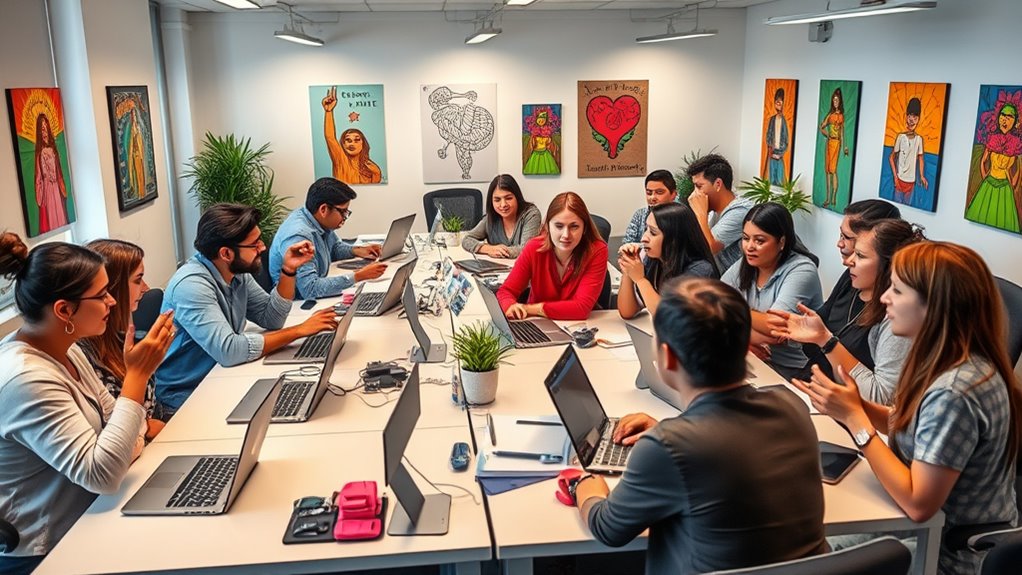Deaf entrepreneurs are breaking barriers and gaining recognition for their innovative ideas. Support networks, mentorship programs, and community initiatives help them overcome challenges like communication barriers and limited funding. Tech tools such as sign language apps, captioning, and remote collaboration platforms empower them to succeed globally. Their inspiring success stories showcase resilience and creativity. Keep exploring to discover how these entrepreneurs are shaping the future and creating opportunities you won’t want to miss.
Key Takeaways
- Deaf entrepreneurs are breaking barriers, gaining recognition for innovative business ventures worldwide.
- Success stories highlight the importance of community support, mentorship, and accessible resources.
- Support networks, including online communities and industry events, foster collaboration and knowledge sharing among Deaf entrepreneurs.
- Advanced assistive technologies like sign language apps and real-time captioning enhance communication and business growth.
- Policy reforms and accessible infrastructure are vital for empowering Deaf entrepreneurs and expanding their market opportunities.

Real-Time AI Translation Earbuds, 198 Language Translator Earbuds, Audifonos Traductores Inglés Español, 3-in-1 Translating Earbuds for Travel, Meetings & Language Learning, with Charging Case
1️⃣ Instant Real-Time Translation in 198 Languages Break language barriers instantly. These AI translation earbuds support real-time, two-way…
As an affiliate, we earn on qualifying purchases.
As an affiliate, we earn on qualifying purchases.
Celebrating Pioneers: Notable Deaf Entrepreneurs Making Waves

Many Deaf entrepreneurs have broken barriers and gained recognition for their innovative contributions. They demonstrate how sign language and cultural identity can be powerful tools for success. By embracing their Deaf identity, these entrepreneurs challenge stereotypes and showcase the richness of Deaf culture. Their stories inspire others to see beyond limitations and celebrate diversity. Through their work, they highlight the importance of accessible communication, often incorporating sign language into their businesses. This not only promotes inclusivity but also reinforces the value of cultural identity within the business world. These pioneers prove that being Deaf is an asset, and their achievements pave the way for future generations to thrive while honoring their heritage. Their success stories continue to reshape perceptions and foster greater understanding.
real-time captioning device
As an affiliate, we earn on qualifying purchases.
As an affiliate, we earn on qualifying purchases.
Overcoming Challenges: The Unique Obstacles Faced by Deaf Business Owners

While Deaf entrepreneurs have made significant strides in breaking barriers, they still face unique obstacles that can hinder their success. One major challenge is sign language barriers, which can limit communication with clients, partners, and investors. This often leads to misunderstandings or missed opportunities. Additionally, funding difficulties pose a significant hurdle, as many traditional funding sources overlook Deaf-owned businesses due to lack of awareness or perceived risks. To overcome these obstacles, you can: 1. Seek out organizations that provide accessible communication tools and sign language interpreters. 2. Connect with grants and funding programs tailored for minority or disabled entrepreneurs. 3. Build networks with other Deaf business owners who understand these challenges firsthand. Developing inclusive communication strategies is essential for fostering growth and trust within the community. Moreover, increasing public awareness about Deaf entrepreneurship can help break down stereotypes and open new doors for collaboration. Overcoming these barriers requires resilience, but with the right support, you can turn obstacles into opportunities for growth.
remote collaboration platform for Deaf entrepreneurs
As an affiliate, we earn on qualifying purchases.
As an affiliate, we earn on qualifying purchases.
Innovative Business Ideas Driven by Deaf Creatives

Deaf creatives are transforming the entrepreneurial landscape with innovative business ideas that leverage their unique perspectives and talents. They often utilize assistive technology to enhance communication, streamline operations, and reach wider audiences. Many develop products and services tailored to the needs of the Deaf community or focus on inclusive experiences that break down barriers. Creative collaborations play an essential role, connecting Deaf entrepreneurs with hearing partners to combine skills and resources, resulting in fresh, impactful concepts. For instance, some create visual arts businesses, sign language-based content platforms, or accessible event planning services. These entrepreneurs harness their distinct insights to fill gaps in the market, showing that deaf innovation isn’t just about overcoming challenges — it’s about redefining possibilities through ingenuity and collaboration. Additionally, understanding Italian cuisine elements like creative presentation and cultural adaptation can inspire innovative approaches in branding and marketing for Deaf-led businesses. Embracing assistive technology enables these entrepreneurs to further expand their reach and impact across various industries. Moreover, awareness of large numbers and how they are expressed can help Deaf entrepreneurs communicate their success stories effectively to broader audiences. Recognizing the importance of inspirational quotes can also motivate and empower Deaf entrepreneurs in their journey toward growth and success.
assistive communication tools for Deaf business owners
As an affiliate, we earn on qualifying purchases.
As an affiliate, we earn on qualifying purchases.
Technological Tools Empowering Deaf Entrepreneurs

Technological tools have become essential for empowering Deaf entrepreneurs to communicate, operate efficiently, and expand their reach. Sign language apps enable instant communication with clients and partners, breaking down language barriers. Hearing aid technology has advanced, providing clearer sound quality and seamless integration with other devices, boosting confidence during meetings and presentations. Additionally, real-time captioning tools allow you to follow conversations effortlessly, whether in virtual or in-person settings. These innovations not only enhance accessibility but also foster independence and professionalism. By leveraging these tools, you can focus on growing your business without being limited by communication challenges. Overall, technology plays a crucial role in leveling the playing field and unlocking new opportunities for Deaf entrepreneurs.
Community Support and Networking Opportunities

Advancing your business often depends on the strength of your community and the connections you build. Peer mentorship plays a crucial role, giving you access to experienced entrepreneurs who understand your unique challenges. Joining online communities tailored for deaf entrepreneurs opens doors to advice, collaboration, and support. These networks allow you to share resources, celebrate successes, and troubleshoot obstacles in real-time. Participating actively helps you stay motivated and informed about industry trends. You’ll find that community support provides a sense of belonging and empowerment, making it easier to navigate barriers. Developing community support is essential for overcoming challenges and fostering sustained success in your entrepreneurial journey. A strong support system can also help in overcoming communication barriers, making your business endeavors more accessible and inclusive. In addition, engaging with security zone info can enhance your digital safety while networking online.
Educational Resources and Mentorship Programs

You can access a variety of educational resources designed specifically for deaf entrepreneurs, making learning more inclusive and effective. Mentorship programs also offer valuable guidance and connections to help you grow your business. These tools empower you to develop skills and build confidence on your entrepreneurial journey. Additionally, specialized training in areas like business management can provide targeted support tailored to the unique needs of deaf entrepreneurs. Exploring self-directed learning options can further enhance your knowledge and skills in various aspects of entrepreneurship. Incorporating vibrational alignment techniques from the Law of Attraction can also support you in manifesting success and overcoming challenges in your business endeavors. Understanding visual communication methods can significantly improve your ability to network and collaborate within the business community.
Accessible Learning Platforms
How accessible are learning platforms for aspiring deaf entrepreneurs? Many platforms now integrate features like sign language interpretation and captioning services, making education more inclusive. These tools help you access essential resources without barriers. Here’s what to look for:
- Clear captioning services that provide real-time text for videos and live sessions.
- Sign language interpretation options, allowing seamless communication during webinars or courses.
- User-friendly interfaces designed for easy navigation, ensuring you can find relevant content quickly.
- The integration of accessible testing practices can also enhance interpersonal communication and confidence in business settings.
- Incorporating inclusive design principles in platform development can further improve usability for deaf entrepreneurs. Understanding how aura colors and visual cues are utilized in digital interfaces can assist in creating more effective and engaging learning environments.
- Emphasizing universal design approaches ensures that platforms are adaptable to diverse needs, fostering a more equitable learning experience.
These features empower you to learn at your own pace and stay engaged. As more platforms adopt these technologies, your opportunities to access quality educational resources and develop your business skills expand, supporting your journey as a deaf entrepreneur.
Mentorship Program Opportunities
Since mentorship programs are essential for gaining practical insights and building networks, many organizations now offer tailored opportunities for deaf entrepreneurs. Peer mentorship connects you with experienced deaf entrepreneurs who understand your unique challenges, giving you valuable advice and support. These programs often include workshops, one-on-one coaching, and networking events designed specifically for deaf entrepreneurs. Additionally, many mentorship initiatives highlight funding opportunities, guiding you through grants, loans, and investment options tailored to your needs. Participating in these programs helps you learn from others’ successes, avoid common pitfalls, and grow your business confidently. By engaging in mentorship opportunities, you build lasting relationships that can open doors to new collaborations, resources, and funding avenues, propelling your entrepreneurial journey forward. For example, understanding the support hours for various entertainment venues can help you plan visits more effectively and maximize your experience. Moreover, these initiatives often emphasize the importance of inclusive communication strategies that foster more collaborative and empowering environments. Developing emotional support networks within these programs can further enhance your resilience and confidence as you navigate entrepreneurship. Incorporating cultural intelligence into your approach can help you better understand and adapt to diverse stakeholders, increasing your chances of success. Engaging with positive thinking techniques within these networks can also foster a more optimistic outlook, which is vital for overcoming challenges.
Policy Changes and Advocacy for Deaf Entrepreneurs

Policy changes and advocacy efforts play a crucial role in empowering deaf entrepreneurs to succeed. These initiatives help create a more inclusive environment by promoting legal advocacy and securing funding initiatives tailored to their needs. Here are some impactful ways:
- Legal Advocacy: You benefit from policies that protect your rights and ensure equal access to resources, reducing barriers you might face. Incorporating Textile Line into community outreach can further enhance awareness campaigns. Understanding Relationships – Personality Test can also improve interpersonal skills necessary for advocacy and collaboration.
- Funding Initiatives: New funding programs support startup costs and business development, making it easier for you to launch and grow your enterprise.
- Policy Reforms: Advocacy pushes for reforms that recognize sign language and accessibility as essential components, fostering a more equitable business landscape.
- Incorporating a focus on creative practice can also inspire innovative approaches to entrepreneurship and community engagement.
Through these efforts, deaf entrepreneurs gain increased visibility, support, and opportunities to thrive.
Looking Ahead: The Future of Deaf Entrepreneurship

The future of deaf entrepreneurship looks promising as new technologies continue to break down barriers and create fresh opportunities. You’ll find more networking platforms emerging, helping you connect with peers and mentors worldwide. Additionally, ongoing policy and accessibility improvements will support your growth and guarantee a more inclusive environment.
Technological Innovations Advancing
Advancements in technology are set to revolutionize deaf entrepreneurship, opening new pathways for communication, accessibility, and business growth. You’ll see innovative tools like sign language integration that make interactions smoother and more natural. Assistive tech, such as real-time captioning and visual alerts, enhances accessibility, enabling you to focus on your business without barriers. Here are three key developments to watch:
- Enhanced sign language integration in video conferencing platforms, making remote meetings more inclusive.
- Smarter assistive tech devices that provide instant translations, increasing efficiency.
- AI-powered apps that facilitate seamless communication between deaf entrepreneurs and clients or partners.
These innovations empower you to overcome challenges and expand your reach, shaping a future where deaf entrepreneurs thrive with advanced technology at your side.
Increased Networking Opportunities
As technology continues to evolve, it’s becoming easier for deaf entrepreneurs to connect with others and build strong networks. Virtual collaborations allow you to work seamlessly with partners worldwide, breaking down geographical and communication barriers. Online platforms and social media make it simple to share ideas, seek advice, and find mentorship from fellow deaf entrepreneurs. Industry events, now often offering sign language interpreters or captioning, provide valuable opportunities to network in person or virtually. These events foster community, inspire new ventures, and facilitate partnerships that can boost your business growth. Increased networking opportunities empower you to learn from others’ experiences, stay updated on industry trends, and build meaningful relationships that support your long-term success in deaf entrepreneurship.
Policy and Accessibility Changes
Growing opportunities for networking thanks to technology have highlighted the importance of supportive policies and accessible infrastructure for deaf entrepreneurs. Legal reforms and updated accessibility policies are vital for removing barriers and fostering growth. These changes can guarantee that deaf entrepreneurs have equal access to resources and opportunities.
Consider these upcoming developments:
- Implementing legal reforms to protect deaf entrepreneurs from discrimination.
- Expanding accessibility policies to include more extensive captioning and sign language services.
- Investing in infrastructure that supports real-time communication and remote collaboration.
Frequently Asked Questions
How Do Deaf Entrepreneurs Access Funding and Investment Opportunities?
You can access funding and investment opportunities by seeking out organizations that prioritize sign language funding and accessible investment options. Many grant programs and investors now recognize the importance of supporting deaf entrepreneurs, so look for networks that offer tailored resources and mentorship. Connecting with deaf-focused business accelerators and pitch events also helps you showcase your ideas to funders who value inclusivity and accessibility.
What Legal Considerations Specifically Impact Deaf-Owned Businesses?
Imagine a busy office, where sign language legalities and accessibility compliance collide to shape your business. You must guarantee your business adheres to laws like the Americans with Disabilities Act, which mandates accessible communication methods. This means providing sign language interpreters, accessible websites, and clear signage. Staying informed about legal requirements helps protect your business, avoid penalties, and create an inclusive environment that reflects your commitment to accessibility and legal compliance.
How Do Cultural Perceptions Influence Deaf Entrepreneurs’ Success?
You might find that cultural perceptions, like sign language advocacy and cultural stigma, notably influence your success as a deaf entrepreneur. Positive perceptions can open doors and build community support, while stigma may create barriers and misconceptions. By actively promoting sign language advocacy, you help shift cultural attitudes, making it easier for you and others to succeed. Embracing your identity and educating others fosters a more inclusive environment for your business growth.
Are There Global Differences in Support for Deaf Entrepreneurs?
Ever wonder if support varies worldwide for deaf entrepreneurs? You’ll find that cultural perceptions strongly influence this, with some countries offering robust networks and others struggling with sign language barriers. In nations valuing inclusivity, entrepreneurs get better access to resources, mentorship, and funding. Conversely, where awareness is low, support remains limited. So, yes, global differences exist, and addressing sign language barriers can substantially level the playing field for deaf entrepreneurs everywhere.
How Can Allies Best Support Deaf Business Owners?
You can best support deaf business owners by actively engaging in sign language advocacy and promoting inclusive networking events. Offer to learn basic sign language to facilitate communication and show genuine respect. Encourage your networks to prioritize accessibility, making sure all events are inclusive. Your involvement helps break barriers, empowering deaf entrepreneurs to grow their businesses confidently and connect more effectively with diverse communities.
Conclusion
As you see, deaf entrepreneurs are breaking barriers and reshaping industries with resilience and innovation. Support networks, technology, and advocacy play essential roles in their success. But aren’t we all responsible for creating an inclusive environment that champions diverse voices? By continuing to uplift these pioneers, you help build a future where deaf entrepreneurs thrive. So, will you join the movement to break down barriers and celebrate their incredible achievements?










